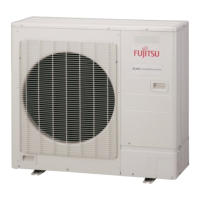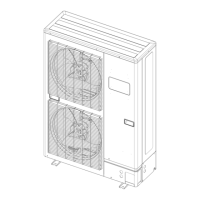En-5
4.2. Protection of pipes
Protect the pipes to prevent the entry of moisture and dust.•
Especially, pay attention when passing the pipes through a hole or connecting the •
end of a pipe to the outdoor unit.
Location Working period Protection method
Outdoor
1 month or more Pinch pipes
Less than 1 month Pinch or tape pipes
Indoor - Pinch or tape pipes
4.3. Refrigerant pipe size and allowable piping
length
CAUTION
Keep the piping length between the indoor unit and outdoor unit within the allowable
tolerance.
Capacity [BTU/h class] 30,000 36,000
Pipe diameter <Liquid/Gas> [mm (in.)] 9.52 (3/8) / 15.88 (5/8)
Max. piping length (L) [m] 50
Min. piping length (L) [m] 5
Max. height difference (H)
<Indoor unit to outdoor unit> [m]
30
View (Example)
sd
5. PIPE INSTALLATION-1
5.1. Brazing
CAUTION
If air or another type of refrigerant enters the refrigeration cycle, the internal pressure in
the refrigeration cycle will become abnormally high and prevent the unit from exerting
its full performance.
Apply nitrogen gas while brazing the pipes. If a pipe is brazed without applying
nitrogen gas, an oxidation lm will be created.
This can degrade performance or damage the parts
in the unit (such as the compressor or valves).
Nitrogen gas pressure: 0.02 MPa
(= pressure felt sufciently on the back of the hand)
Pressure regulating valve
Cap
Brazing area
Nitrogen gas
For brazing material, use phosphor copper that does not require ux. Do not use ux to
braze pipes. If the ux is the chlorine type, it will cause the pipes to corrode.
Furthermore, if the ux contains uoride, it will adversely affect the refrigerant pipe
system such as by degrading the refrigerant.
If uoride is contained, quality of refrigerant deteriorates and affects the refrigerant
piping system.
5.2. Flare connection (pipe connection)
CAUTION
Do not use mineral oil on a ared part. Prevent mineral oil from getting into the system
as this would reduce the lifetime of the units.
While welding the pipes, be sure to blow dry nitrogen gas through them.
The maximum lengths of this product are shown in the table. If the units are further
apart than this, correct operation cannot be guaranteed.
5.2.1. Flaring
Use special pipe cutter and are tool exclusive for R410A.•
(1) Cut the connection pipe to the necessary length with a pipe cutter.
(2) Hold the pipe downward so that the cuttings will not enter the pipe and remove any
burrs.
(3) Insert the are nut (always use the are nut attached to the indoor and outdoor
units respectively) onto the pipe and perform the are processing with a are tool.
Leakage of refrigerant may result if other are nuts are used.
(4) Protect the pipes by pinching them or with tape to prevent dust, dirt, or water from
entering the pipes.
Check if [L] is ared uniformly and
is not cracked or scratched.
Pipe
A
Die
Pipe outside diameter
[mm (in.)]
Dimension A [mm]
Flare tool for R410A, clutch type
9.52 (3/8)
0 to 0.5
15.88 (5/8)
Pipe outside diameter
[mm (in.)]
Dimension B
-
0
0.4
[mm]
9.52 (3/8) 13.2
15.88 (5/8) 19.7
When using conventional are tools to are R410A pipes, the dimension A should •
be approximately 0.5 mm more than indicated in the table (for aring with R410A
are tools) to achieve the specied aring. Use a thickness gauge to measure the
dimension A.
Width across ats
Pipe outside
diameter [mm (in.)]
Width across ats
of Flare nut [mm]
9.52 (3/8) 22
15.88 (5/8) 29
5.2.2. Bending pipes
CAUTION
To prevent breaking of the pipe, avoid sharp bends. Bend the pipe with a radius of
curvature of 100 mm to 150 mm.
If the pipe is bent repeatedly at the same place, it will break
.
If pipes are shaped by hand, be careful not to collapse them.•
Do not bend the pipes at an angle of more than 90°.•
When pipes are repeatedly bent or stretched, the material will harden, making it •
difcult to bend or stretch them any more.
Do not bend or stretch the pipes more than three times.•
5.2.3. Pipe connection
CAUTION
Be sure to install the pipe against the port on the indoor unit and the outdoor unit
correctly. If the centering is improper, the are nut cannot be tightened smoothly. If the
are nut is forced to turn, the threads will be damaged.
Do not remove the are nut from the outdoor unit pipe until immediately before
connecting the connection pipe.
After installing the piping, make sure that the connection pipes do not touch the
compressor or outer panel. If the pipes touch the compressor or outer panel, they will
vibrate and produce noise.
9374995295_IM.indb 5 22/1/2556 16:12:20
